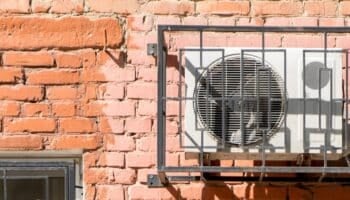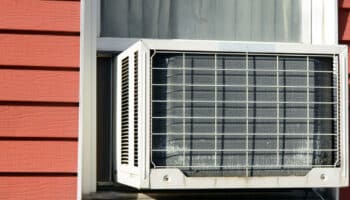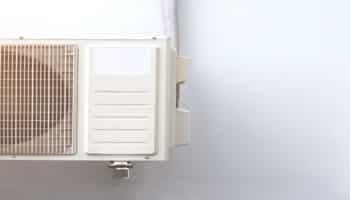Yes, there should be a sense of urgency here!
If you’re trying to solve a smelly window air conditioner and you’re positive it isn’t a mold or mildew smell, the first thing you need to do is turn it off and open your windows. Especially if the smell makes you think of exhaust.
Once you’ve done that, come back to this article, and I’ll explain the urgency and what you need to do.
If you’re smelling something musty, moldy, or mildewy, keep reading.
A smelly window air conditioner could be caused by a smoldering or burning plastic part, a dead creature, bacteria growth, or burned-out parts and components, such as the fan motor. These issues can cause your AC to smell like exhaust, fish, mold, urine, and more.
Keep reading and we’ll dig deep into the causes and solutions for your stinky air conditioner.
What You’ll Need
Depending on the symptom and solutions outlined below, there are different things you’ll need. Each section will mention what you need, but below is a cumulative list.
- Screwdriver
- Soft brush or cloth
- Spray bottle
- Dish soap — or any mild detergent — and warm water
- Garden hose
- Vacuum cleaner or shop vac
- Vinegar
#1 If Your Window Air Conditioner Smells like Alcohol or Chemicals
While window air conditioners don’t contain a lot of refrigerant, there is a chance that the refrigerant could be leaking.
The good news is that most of these leaks are micro leaks, and happen over a long period of time. So despite what some people think – you’re not in any danger.
While refrigerants in large concentrations CAN be dangerous, in my experience window units are too small to pose a threat.
However, fixing a refrigerant leak is a different story.
In the US, this is a Section 608 Technician Certification, part of the EPA’s (Environmental Protection Agency) Clean Air Act. Anyone who maintains, repairs, services, or disposes of any equipment that uses refrigerant must be certified.
If your air conditioner could be smelling like strange chemicals or alcohol, and it’s lost its ability to cool as well recently, then leave the air conditioner unplugged and call a reputable service technician in your area.
#2 Window AC Smells like Mold or Mildew
Sometimes, window air conditioners can start giving off a musty smell. You probably appreciate some cool air blowing on your face on a hot summer day, but not so much when it stinks like smelly socks.
If your air conditioner is making your home smell like a swamp, there’s a very good reason for that. And that reason is likely because it needs a good cleaning. Have you been keeping up with regular maintenance? If not, this could be the price you pay.
Accumulated moisture.
The process of cooling your air involves removing moisture from it, so if you live in a very humid environment some, or most of that moisture may not drain properly. If that’s the case it could lead to the growth of mold or mildew in the unit.
Step 1 – Unplug your air conditioner and carefully remove the front grill, filter, and any accessible panels.
Step 2 – Put together a spray bottle of warm water and mild detergent — dish soap will do — then begin cleaning down the unit.
Clogged drain.
Over time, dirt, debris, and even algae can clog up the drain line or drain pan at the bottom of the air conditioner. This will stop water from flowing out through the drain, eventually creating a breeding ground for mold and mildew.
Step 1 – Unplug your air conditioner, open the front grill, and check the drain pan. If it’s full, it has a clog somewhere.
Step 2 – If you can access the outside portion of your window air conditioner look for a drain plug or hole. Check to see if it has a clog, and clean it out if it does.
Step 3 – Try tipping your air conditioner slightly to force the water to move out. After removing the water clean the drain pan, if it’s very rusty, replace it.
Step 4 – Find the drain line and flush it out with a mixture of water and vinegar. This will disinfect and eliminate any mold spores.
Dirty air filters.
If you’re not changing your filters on a regular basis they’ll eventually become clogged with dust, dirt, and a variety of debris. Eventually, this can contribute to the growth of mold or mildew.
Step 1 – Remove the front grill from your air conditioner.
Step 2 – Refer to your user’s manual for information on your air filter. Do you have the type that needs to be replaced or cleaned?
Step 3 – Replace your air filter as per the manufacturer’s guidelines — if your filter is replaceable.
Step 4 – If your air conditioner has a permanent filter, remove it, and using a vacuum cleaner, brush, or cloth get rid of as much dirt as possible.
Step 5 – Combine warm water and dish soap — or any other mild detergent — in a spray bottle and thoroughly clean your filter. Alternatively, you can do this in any deep sink, or outside with a garden hose.
Step 6 – Allow the filter to completely air dry before putting it back in the air conditioner. Leaving it outside in the sun is a good idea, but you could even use a hair dryer.
Putting a filter that’s even slightly damp back into your air conditioner will just start the process of mold growth over again — immediately.
#3 Troubleshooting an Air Conditioner with a Burning Smell

Your air conditioner is mostly cooling things down so why does it smell like it’s burning things up instead? The good news is it’s typically not something that’s cause for concern, but you do want to address it immediately just in case.
The following is a collection of several common reasons why your air conditioner may be making a burning smell and what you can do to fix it.
A buildup of dust.
As the section above detailed, a dirty air conditioner is a problematic air conditioner. Over time dust and debris can accumulate on the internal components, such as the fan motor or coils.
Naturally, as the unit operates it generates heat which in turn will heat up any collected dirt. Eventually, this can result in a burning smell.
Step 1 – Unplug your air conditioner
Step 2 – Use a soft brush or vacuum cleaner with a brush attachment and gently clean the coils and all other internal components.
Overloaded electrical circuit.
Depending on the wattage of your air conditioner there’s a good chance that it should be plugged into a dedicated circuit. If not, you’ll overload the circuit. Typically, a breaker or fuse should trip the circuit, but if you keep ignoring this symptom, simply resetting the breaker or replacing the fuse without addressing the cause, you’ve created a fire hazard.
Solution: Go to your breaker panel or fuse box and determine the amperage of the circuit your air conditioner is on. Then determine if your air conditioner is too powerful for that circuit. If so, you need to move your air conditioner to another circuit or hire a qualified electrician to upgrade your electrical system.
Faulty wiring or components.
A burning smell may also be an indication of faulty wiring or components within your air conditioner. This could be because of a number of things, including loose connections, damaged insulation, or even malfunctioning parts. This could also lead to the smell of burning plastic.
Solution: Check for any loose connections or frayed wiring. If you discover something that’s beyond your ability to handle, consult a licensed HVAC technician to diagnose and repair the electrical components safely.
Improper maintenance.
Your window air conditioner requires regular cleaning and maintenance, and neglecting a good routine can lead to malfunctions and overheating. Which will lead to a burning smell.
Solution: Always stick to the manufacturer’s maintenance schedule. Keep your filters replaced or cleaned, and the complete unit cleaned and dusted regularly. Failure to do so can also lead to an air conditioner that stops cooling properly.
#3 Something Smells Fishy (Or Like Urine)

If you don’t live near a body of water or have a fish tank in your home, that fishy smell could be coming from your air conditioner.
The main reason for the fishy smell emanating from your air conditioner is overheated plastic in its electrical components. Manufacturers use plastic that contains a chemical that will give off a fish or urine smell when it gets hot or burns.
Note that this could be plastic from a variety of different sources, not just your air conditioner. It could be a switch, an outlet, or even an extension cord.
Step 1 – Confirm that the smell is coming from your air conditioner and not somewhere else.
Step 2 – Unplug your air conditioner and don’t plug it back in until you’ve addressed the problem since the smell indicates a fire hazard.
Step 3 – Open up the unit and check for any visual damage, such as melting or scorched plastic. Once you’ve determined or ruled out the source of the overheating, you’ll need to decide whether it’s worth getting the unit repaired or buying a new window air conditioner.
#4 Window AC Smells Like Rotten Eggs
For an appliance that has a single job — cooling the air in your home — an air conditioner puts out a lot of different smells. Including rotten eggs! I don’t know about you, but I’d prefer the heat.
So what are some reasons for this smell?
Clogged condensate drain.
Like many of the other odors mentioned above, standing water could be the cause, since eventually dirt and mold can accumulate. It’s a breeding ground for a variety of different bacteria and could lead to the smell of rotting eggs.
If you live in a naturally dry environment, your air conditioner may not generate a lot of condensation. And if your reservoir isn’t full, you may not get a notification to empty it.
Step 1 – Make it a practice to regularly check and empty your condensate pan, even if it’s not full. Perhaps make a schedule to empty it every week, or every few days, regardless of the amount of water in it.
Step 2 – Make sure you keep the reservoir clean. You can wash it out with soap and water or regularly do a vinegar and water rinse. Vinegar has strong antibacterial properties, so it might be the better choice.
Dead animal.
Depending on your living conditions, this one is probably unlikely, but if you do have rodents or pests, there is a chance that some small creature has found its way into your air conditioner and died.
Once something dead begins to decompose, there is a chance that it can emit a distinct rotten egg smell.
Step 1 – If you suspect that there’s something dead rotting in your air conditioner, and if you have a strong gag reflex, you might want to get someone else to do this for you.
Step 2 – Unplug, and open up your air conditioner.
Step 3 – Do a visual inspection and if necessary, remove any dead things. Be sure to wear rubber gloves — and perhaps a gas mask!
Conclusion
As you read through the above, you may have noticed a common denominator. A lack of routine maintenance and cleaning is usually behind any sort of bad odors.
To recap, these are the odors we discussed:
- Exhaust fumes
- Mold or mildew
- A burning smell
- Fish or urine-like odors
- Rotten eggs
With the exception of your air conditioner smelling like exhaust fumes, which could be due to a refrigerant leak, everything else — at least to some extent — hinged upon how clean or well-maintained your air conditioner is.
Is there a takeaway here? Yes! Set and keep a regular cleaning and maintenance schedule throughout the cooling season.
Hopefully, this article has helped you pinpoint the source of the bad smell coming from your air conditioner. While you’re here, why not check out some of our related posts below? Perhaps we can help you with something else.







